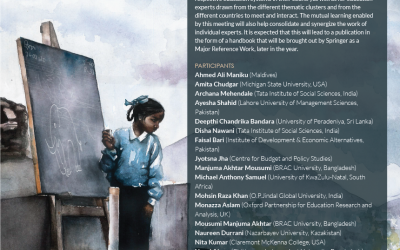The geo-political unit of South Asia is formed by ten modern nation-states that include Afghanistan, Bangladesh, Bhutan, India, Maldives, Mauritius, Myanmar, Nepal, Pakistan and Sri Lanka. These South Asian countries have a long shared history of over 3 millennia. Their common religious and cultural heritage can be traced back in the more recent past to the hold of the Mughal rulers over large parts of the region as also to British colonisation of different territories of South Asia. Today, South Asia accounts for 24% of the world’s population including 27% of the world’s youth, 29% of the world’s ‘illiterates’ and 40% of the world’s poor. The region is also home to a high concentration of linguistic, cultural and religious diversities as well as economic and social inequalities that give its politics, institutions and development a unique character while also posing unique challenges.
At present, scholarship on the education systems in South Asia is very limited. Each country with its own unique geographical, cultural, economic and political character and history is of interest and significance.
The last seventy years of the region is rich in terms of state formation, the development of new institutions and shaping of the social sector including education. The countries have responded to common issues such
as overcoming the colonial legacy, language diversity, girls’ education, minority rights in education, etc., in uniquely different ways.
This international symposium will provide an opportunity for participants to discuss the present status and future evolution of the respective education systems in their country. The entire range of education, from preschool to higher education and beyond, will be gathered into 8 thematic clusters:
1. indigenous education traditions
2. history of education
3. school education systems and policies
4. higher education systems and policies
5. political economy of education
6. pedagogy, teachers and teacher education
7. learner diversity and marginality; and
8. knowledge and curriculum
The meeting will provide a significant opportunity for education experts drawn from the different thematic clusters and from the different countries to meet and interact. The mutual learning enabled by this meeting will also help consolidate and synergize the work of individual experts. It is expected that this will lead to a publication in the form of a handbook that will be brought out by Springer as a Major Reference Work, later in the year.
Participation in this meeting is by invitation only.
 icts
icts res
res in
in

